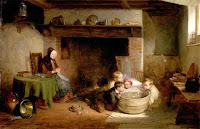Contrary Winds
During the influenza pandemic of 1918 when public gatherings were prohibited, Rev. Homer Cox penned and distributed the sermon: Contrary Winds, based on Matthew 14:22-24 (KJV):
And straightway Jesus constrained his disciples to get into a ship, and to go before him unto the other side, while he sent the multitudes away. And when he had sent the multitudes away, he went up into a mountain apart to pray: and when the evening was come, he was there alone. But the ship was now in the midst of the sea, tossed with waves: for the wind was contrary.
Cox said:
The hungering multitudes have been bountifully fed and sent to their homes in the surrounding villages the disciples have embarked for their voyage across the sea; and, as was His custom after a trying day of toil, or before a day of great responsibility, the Saviour has composed His soul in the solitudes of the mountain alone in prayer. Rapt in holy converse with His heavenly Father, the first three watches of the night have passed almost unheeded. But the cries of distress always catch the ear of [the] Deity, though engaged in the loftiest pursuits; and in the heights of his communion He perceives His despairing disciples battling on the bosom of the deep with threatening waves and contrary winds. The ever compassionate heart of Christ responds, and, superior to the laws of nature He speeds His way across the waters to their rescue. This significant account is full of comfort for us who today are struggling across the sea of life, in the teeth of a gale that beats fiercely upon our bark.
Just now the "Contrary Winds" which we are called upon to face are the winds of physical illness. With a blighting plague sweeping over our city, doctors difficult and nurses almost impossible to secure, working forces almost depleted, all public meetings forbidden, the largest auditorium in the city, usually a scene of gaiety and pleasure now turned int a charnel house, and what seems worst of all the houses of prayer closed until the very silence of their bells is oppressive with all the pain and suffering, our hearts heavy with fear and threatened with sorrow, we long for the form of the Son of God to appear in the storm and quiet the waves. . .
To any on whom these or other winds are blowing our hearts go out in deepest love and sympathy. We realize that when one member suffers the whole body suffers with it. We pray that out of these affliction may come a closer walk and a greater devotion to the Lord and His work and that in the midst of the storm there may bee seen the form of the Son of God approaching, and there may be heard His voice speaking the comforting words, "It is I, be not afraid." He only is King of the tempest. Look to Him, call upon Him, trust in Him and He will come and speak to your heart.
But, says someone, "Will he really speak to me?" Listen to Him as He speaks to you through His word. "God is our refuge and strength, a very present help in trouble. Therefore I will not fear though the earth be removed, and tough the mountains be carried into the midst of the sea: though the waters thereof road and be troubled, though the mountains shake with the swelling thereof. There is a city the river [and] the streams whereof make glad the city of God, the holy place of the tabernacle of the Most High. God is in the midst of her; she shall not be moved: God shall help her and that right early. The heathen raged, the kingdoms removed; he uttered his voice, the earth melted. The Lord of Hosts is with us. The God of Jacob is our refuge. Come, behold the works of the Lord, what desolations he hath made in the earth. He maketh wars to cease unto the ends of the earth; he breaketh the bow and cutteth the spear in sunder; he burneth the chariot in fire. Be still and know that I am God; I will be exalted among the heathen, I will be exalted in the earth. The Lord of Hosts is with us, the God of Jacob is our refuge."
Are not these words of the Psalmist a message to us today? And do they not bring us peace and comfort in the storm?
Reference
Osborne, B. L.,(1930), Homer L. Cox: The Man and His Messages, Cleveland, OH: Cleveland Bible Institute


How simply luscious. Thanks, Mark
ReplyDelete